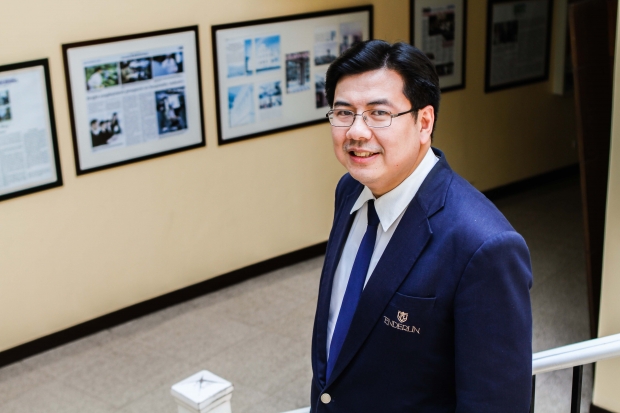Vantage Point : The World of Learning from a Teacher’s Perspective
“When it comes to learning, it works both ways. Mostly teachers mold minds, but at the same time, teachers also learn from their students.” In this feature article, Professor Rocky Laurel will give us a glimpse of the world of learning, from a teacher’s perspective.
Starting out in his career, Professor Rocky Laurel got involved with their family business right after college, with a degree in Management with Applied Chemistry from Ateneo de Manila University. Yet his heart has always been in teaching, and leaving the business, he eventually took further studies to pursue his passion.
Meanwhile, during his college years, Professor Rocky described his younger self as “typical,” something most students could relate to. “I was more interested with hanging out, making friends, meeting with people,” he said. “I could’ve done much better. Having good grades, at least in college, would open more doors, it gives you better opportunities.”
Pursuing the Passion
This did not stop him from striving harder, however. “After I graduated I discovered what I was interested in, and I started pursuing it. Naturally, I worked harder,” he went on to say.
It was then that he finished his master’s in Business Administration from De La Salle University and afterwards, in Finance from the University of the Philippines, Diliman. “I became more mature and I became more interested in what I was studying, which was in Finance. If you do what you love, if you follow your passions, then you’ll exert greater effort.”
Professor Rocky started teaching in the University of Asia and the Pacific. Back then, Enderun Colleges was still situated in Wynsum Corporate Plaza at Ortigas Center. “So I used to see the students in their uniforms,” he narrated. “I didn’t know where they were studying. Until eventually, I answered an ad for Enderun who was looking for faculty.”
In 2008, Enderun transferred to its current location in McKinley Hill, Taguig, and in 2009, the school had an opening for new professors. “I applied to teach, I did a demo, I was accepted,” he added. “I’ve been here ever since, teaching Business Math, Basic Finance, mostly business subjects.”
As a part-time faculty, Professor Rocky teaches 4 classes and at the same time takes on the role of an independent trader. Simultaneously, he is teaching International Finance for graduate students in UP Diliman and is working on his doctorate degree in Business at the same university, proving that learning is a continuous process.
“I still invest in the markets, so that is hopefully something I can derive a large amount of money from,” he mentioned with a laugh. “My specialty is Finance. I want to make money by investing and while doing what I love to do. Something that you can do at the side.”
Connecting the Dots
He also said that one of the people he admires is Warren Buffet, who can be considered the world’s greatest investor. “The way he invests is to look at stocks as a business, not just a security that changes in price. So you look at the company behind the stock: what does it do? What are its future prospects? Will it be here 10, 20, 30 years from now? That’s one side, and the other side is how much is it worth? So you try to derive a value of the company based on your assessment and then you compare it to the market price. If the market price is significantly lower than the value you calculated, then you invest in that company, assuming it’s a good company.”
In connection to this, Professor Rocky explains that the goal of the courses he is teaching is to help his students make better decisions later on, especially in business. “For example, in economics one of the lessons is in making a decision, you weigh the advantages with the disadvantages. That’s what you call a cost-benefit analysis, before making your final decision. So you only pursue a project if the benefits outweigh the cost or something like that.”
What happens outside and inside school are all aligned through his teaching style. “The way I teach economics is very, what we call, intuitive and conceptual. So it’s more about using your common sense to understand economics. And second, I focus not on the theory but on application. How is this relevant to my life? How can I apply it to my life now, and later on in my career?”
On Students
When asked how he tracks the progress of his students, and how he evaluates their understanding of class lessons, Professor Rocky said that is the main goal of his quizzes and exams. “And also there are times that I ask students to report on cases,” he added. “For example, we’ve talked about supply and demand, I can ask them to apply those concepts to a certain industry or certain company, to do their research, and then to report in class.”
As for tackling the challenge of students who are struggling with their subjects, he answered, “So long as the student is exerting effort and is open to learning, I am very much willing to help. So long as they come.” Professor Rocky also recommended availing of free tutorial services at the Academic Success Center for those who need assistance.
Moreover, interaction is what makes teaching fulfilling in itself; the exchange of ideas and sharing of knowledge makes the process worthwhile. “The more diverse the students, the better, because you get different opinions, different points of view,” he said. “And then when it comes to learning, it works both ways. Mostly teachers mold minds, but at the same time, teachers also learn from their students. Especially when students ask questions, that’s an opportunity for teachers to explain the lessons better.”
What Professor Rocky also considers as a plus on his part is when students do simple acts in return. “Every time a student comes back after he’s finished my class and thanks me, either by email or personally when I meet him, that is always very touching and fulfilling for me,” he described. “Very few students do that, but when they do, it becomes very memorable.”
Summing up, his advice for students is reflective of his own experiences. “Once they’ve discovered what they’re passionate about, and they’ve thought of how to make a living or a career out of it, then they should pursue it wholeheartedly. That’s where most likely they can find their success and happiness professionally.” Professor Rocky shared, “I’m much happier, right now, where I am.”






